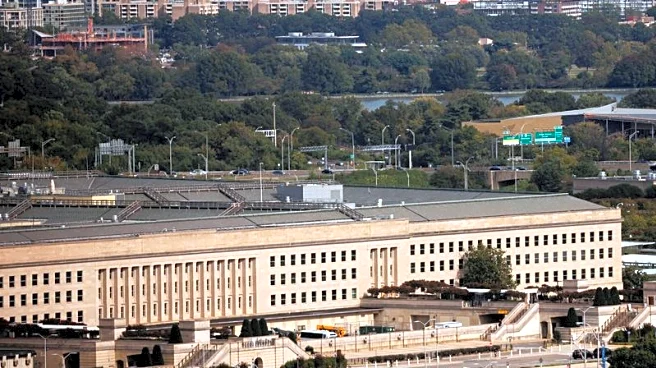By Andrew Goudsward and Helen Coster
WASHINGTON (Reuters) -At least 20 news organizations declined to sign a new Pentagon access policy for journalists, warning of the potential for less comprehensive coverage
of the world’s most powerful military ahead of a Tuesday deadline to accept new restrictions.
The policy requires journalists to acknowledge new rules on press access, including that they could be branded security risks and have their Pentagon press badges revoked if they ask department employees to disclose classified and some types of unclassified information.
Reuters is among the outlets that have refused to sign, citing the threat posed to press freedoms. Others that have announced their refusal to accept the new press access rules in statements or their own news stories are: the Associated Press, Bloomberg News, The New York Times, The Wall Street Journal, The Washington Post, CNN, Fox News, CBS, NBC, ABC, NPR, Axios, Politico, The Guardian, The Atlantic, The Hill, Newsmax, Breaking Defense and Task & Purpose.
Chief Pentagon spokesperson Sean Parnell said in a statement on Monday: "The policy does not ask for them to agree, just to acknowledge that they understand what our policy is. This has caused reporters to have a full blown meltdown, crying victim online. We stand by our policy because it's what's best for our troops and the national security of this country."
The department has set a Tuesday deadline for news organizations to agree to it or turn in their Pentagon press badges and clear out their workspaces in the building by Wednesday.
All five major broadcast networks issued a joint statement on Tuesday, saying, “Today, we join virtually every other news organization in declining to agree to the Pentagon’s new requirements, which would restrict journalists’ ability to keep the nation and the world informed of important national security issues. The policy is without precedent and threatens core journalistic protections. We will continue to cover the U.S. military as each of our organizations has done for many decades, upholding the principles of a free and independent press.”
The New York Times Washington Bureau Chief Richard Stevenson said in a statement on Friday, "Since the policy was first announced, we have expressed concerns that it constrains how journalists can report on the U.S. military, which is funded by nearly $1 trillion in taxpayer money annually. The public has a right to know how the government and military are operating."
Reuters also took issue with the new rules. "Reuters is bound by its commitment to accurate, impartial and independent news under the Thomson Reuters Trust Principles. We also steadfastly believe in the press protections afforded by the U.S. Constitution, the unrestricted flow of information and journalism that serves the public interest without fear or favor. The Pentagon’s new restrictions erode these fundamental values," a spokesperson said.
The rules, which followed negotiations with Pentagon officials in recent weeks, threatened to violate protections for the press under the First Amendment to the U.S. Constitution by regulating routine attempts by reporters to seek newsworthy information and documents from sources, said a lawyer familiar with negotiations with the Pentagon.
The requirement that reporters acknowledge that disclosure of sensitive information could harm U.S. national security could aid prosecutors if they sought to charge a reporter for disclosing defense information under the Espionage Act, the lawyer added.
Conservative cable news outlet One America News signed on to the new policy.
“After thorough review of the revised press policy by our attorney, OAN staff has signed the document,” Charles Herring, the president of OAN parent company Herring Networks, said in a statement. Reuters couldn’t immediately ascertain if other organizations had also signed it.
The Pentagon's policy, announced last month, is the latest expansion of restrictions on press access under Defense Secretary Pete Hegseth, a former Fox News host. Trump has ordered the department to rename itself the Department of War, a change that would require action by Congress.
Hegseth on Monday, while traveling with Trump to Israel and Egypt, responded on social media platform X to news organizations declining to agree to the policy by posting a hand-waving emoji, implying he was bidding them goodbye.
The Pentagon Press Association, which represents more than 100 news organizations that regularly cover the military, including Reuters, urged Pentagon leadership to reconsider the policy, arguing it "gags Pentagon employees and threatens retaliation against reporters who seek out information that has not been pre-approved for release."
The group said it was not issuing a specific recommendation on whether reporters should agree.
The Pentagon revised its proposed policy following negotiations between the department and news organizations that came after they widely condemned requirements that barred credentialed reporters from seeking out sensitive information that was not approved for release.
The revised policy notes that receiving or publishing sensitive information "is generally protected by the First Amendment" but states that soliciting the disclosure of such information "may weigh in the consideration of whether you pose a security or safety risk." The policy adds, "The press's rights are not absolute and do not override the government's compelling interest in maintaining the confidentiality of sensitive information."
(Reporting by Andrew Goudsward in Washington and Helen Coster in New York; Editing by Alistair Bell)









